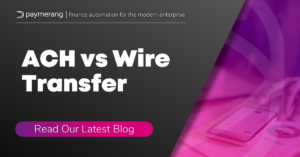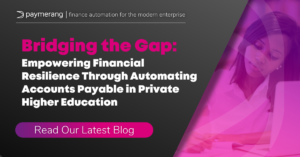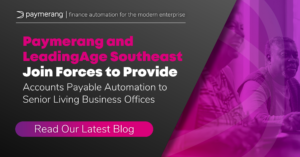7 Ways AP Automation Improves Operational Efficiency
As the economic downturn continues, businesses are looking for ways to reduce costs.
One way to reduce costs is to improve process efficiency.
When it comes to accounts payable processing, most organizations have a lot of work to do to improve efficiency. 33% of accounts payable professionals are working longer hours these days, according to the Institute of Finance and Management (IOFM). Incredibly, eight percent of accounts payable professionals are working an additional two hours per day. And many accounts payable professionals would be working even longer hours if their employer had not put a stop to overtime to reduce costs.
Making matters worse, much of this time is spent on low-value activities such as check printing.
Accounts payable leaders are eager for ways to improve operational efficiency and effectiveness. 27% of payables leaders surveyed by IOFM say that ensuring productivity is their biggest challenge in the new reality. 24% of accounts payable leaders admit that it is a struggle to get suppliers paid on time.
The new reality has impacted efficiency across the accounts-payable lifecycle, including:
- Invoice receipt
- Invoice data capture
- Approval workflows
- Exceptions resolution
One way to improve efficiency is pay suppliers electronically, instead of with a paper check.
Here are 7 ways that electronic payments can wring inefficiencies from your payables processes:
- Less complexity: a single payment file upload initiates payment to all suppliers; instructions are parsed, and payments are remitted in all payment methods, including paper check, virtual card, or ACH. This eliminates the need to log in to multiple banking systems, and the cost of paper, postage, printing, and mailing paper checks.
- Streamlined reconciliation: integrating an electronic payments solution with the general ledger in your ERP platform provides real-time payment reconciliation that eliminates the need for the costly manual keying of data or the decoding of banking messages.
- Fewer errors: uploading a single payment file eliminates costly error-prone manual processes. Payment information also can be pushed automatically from your ERP platform. And many electronic payment solutions provide tools for identifying duplicate payments. Without automation, staff can waste hours uncovering and resolving one payment error.
- Easy integration: electronic payments can be seamlessly integrated with any ERP without requiring material changes to existing accounts payable workflow processes. Approved transactions are uploaded downstream, eliminating duplicate entry of invoice information, and enabling automatic updates of invoice and payment information to the ERP application.
- Better cash management: electronic payments provide greater control over the timing of payments to suppliers. This opens the door to more early-payment discount opportunities. 80% of businesses receive invoices that offer early-payment discounts, per IOFM. Businesses that take advantage of just a discount term of 1/10 net 30 earn an annualized 18% return—a lot more than they can earn from a typical interest-bearing bank account.
- Fewer supplier inquiries: with electronic payments, suppliers have 24/7 access to the status of their payments, as well as their payment history. This visibility helps suppliers better manage their cash without the need to call or e-mail overburdened frontline payables staff. IOFM estimates that it costs $3.60 on average to respond to a single supplier inquiry.
- More time for higher-value activities: few things waste as much staff time as printing, signing, stuffing, mailing, and reconciling check payments to suppliers. 84% percent of the typical accounts payable practitioner’s day is spent on manual tasks, IOFM reports. In fact, accounts payable department managers spend more time on transaction processing than on the managerial tasks they were hired for, IOFM finds. Paying suppliers electronically frees staff from the drudgery of manual check processing, allowing them to focus more of their time on higher-value activities such as data analysis and supplier management.
Eliminating inefficiencies in the accounts-payable lifecycle also benefits employees. Paying suppliers electronically creates a modern process that allows staff to focus on fulfilling tasks.
Want to improve the efficiency of your accounts payable processes, even as staff work from home?
If so, we want to speak with you.
Contact us at sales@paymerang.com to arrange a no-obligation consultation with one of our payment experts.




